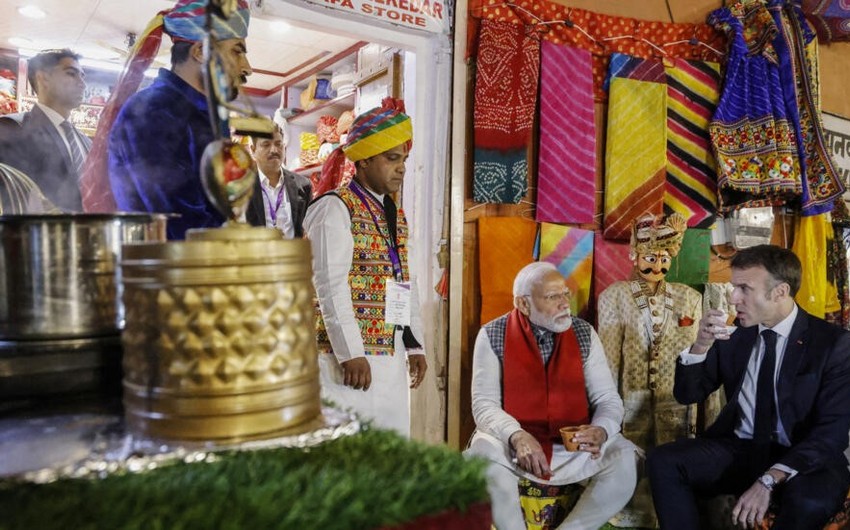The arrival of Emmanuel Macron to India, as an honorary guest on the eve of the Republic Day, celebrated by the Indian government on 26 of January, has put numerous questions on the mind of analysts and human rights watch professionals.
How far is France going to go in order to court their Indian ally? Will the questions of religious intolerance and deportation of the prominent French journalist, Vanessa Dougnac, who was critical of the Indian government be aborded? Is France in complete dependance on Indian arms deals and growing international presence?
The answer to all these questions lies within Indian approach to the arrival of the highly awaited guest. It is worth reminding, India’s first choice for the celebratory event was Joe Biden. Yet, the American president refused to appear due to attempted elimination of the Sikh leader on the American soil and the recent murder of another prominent Sikh activist in Canada.
Arrival of Emmanuel Macron puts a limelight on the approaches that French realpolitik takes in order to promote the bilateral relationship. It is abundantly clear that India’s growing diplomatic strength puts the French side on the position of a dependent side that has to choose its words carefully.
"There is a fundamental asymmetry between India and France," says Jean-Joseph Boillot, Iris research associate and India specialist. "France thinks it can establish a balanced partnership, but in reality, it can no longer say anything about human rights, because today, India is the diplomatic giant."
In his interview to the France 24, Mr. Boillot underlined the tense matters between the two countries, including the case of Ms. Dougnac, a French journalist living and writing in India for the past 20 years. According to Jean-Joseph Boillot, the approach taken by the Indian government in regard to Ms. Boillot, that was ordered to be deported two days before Macron’s visit is nothing but “provocative”.
"It's all very well for France to want to conduct realistic diplomacy, but for India to do this two days before Emmanuel Macron's visit is a provocation. We can see that things are getting much worse both in terms of human rights and press freedom, with Indian journalists increasingly in a position of self-censorship to avoid losing their jobs or suffering physical threats", assures Mr. Boillot.
Moreover, the growing threats to the liberty of exercising the Muslim faith, attacks on the population that is of any other faith other than Hindu, that nationalist Indian government imposes on 170 millions of its Muslim citizens, are tantamount to violation of Human Rights. In recent years, India has also plummeted in the Reporters Without Borders press freedom index, and now ranks 161st out of 180 countries, dropping eleven places between 2022 and 2023.
Since 2014 when Narendra Modi's BJP party came to power, Hindu politicians, the religion of 80% of the population, have multiplied discriminatory laws and policies or carried hate speech against religious minorities, organizing as well campaigns against mixed marriages between Hindus and Muslims.
When questioned by the Huffington Post, the Macron’s entourage sidestepped the issue, assuring us that it was not up to France to "judge the democratic evolution" of India, as long as it "respects its international commitments".
It is difficult to understand what delineation exists in the minds of the French administration between “respect of the international commitments” and the matter of gradual yet unarguable Indian approach to violation of human rights and democratic failures. It is also worth underlining that India being one of the key importers of French arms and munitions, is creating a new approach in its relationship with the Western European nations, based on self-realization of India’s growing diplomatic presence in the world.
India has already purchased 36 French Rafales for its Air Force and is in negotiations to acquire a further 26 for its Navy. It is also keen to consolidate its defense industrial base through joint ventures with French groups, from Dassault to the missile-maker MBDA.
Such a business-oriented approach puts France in a very unsavory yet quite familiar position. After a meeting with the Saudi Prince Bin Salman in the aftermath of the murder of the journalist Jamal Khashoggi in Turkey, that was qualified by the human rights groups as “cynical”, and growing ties between the French leader and Egyptian President Al Sisi, French government repeats the same mistakes it made earlier. At this point, there is a growing consensus that French approach to the geopolitical matters might not be as nuanced as it tries to present.
Jamal Mustafayev


 https://static.report.az/photo/23e8a9bf-ccd2-388f-8db0-419e27d22d80.jpg
https://static.report.az/photo/23e8a9bf-ccd2-388f-8db0-419e27d22d80.jpg

